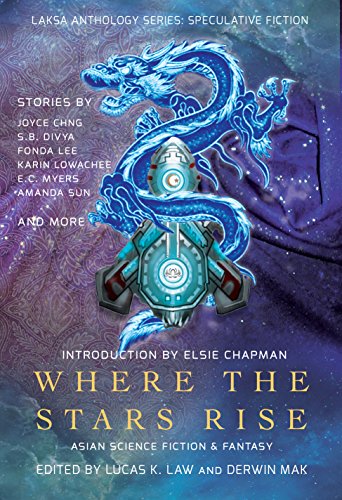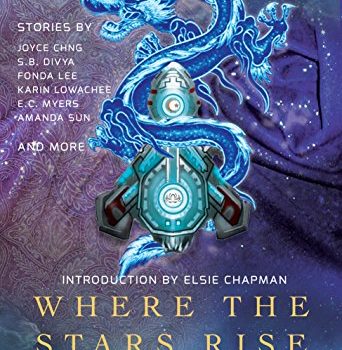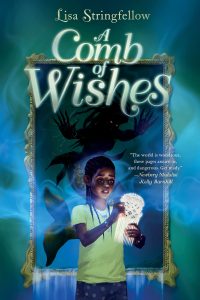Gardner Dozois Reviews Where the Stars Rise: Asian Science Fiction and Fantasy edited by Lucas K. Law & Derwin Mak
 Where the Stars Rise: Asian Science Fiction and Fantasy, Lucas K. Law & Derwin Mak, eds. (Laksa Media 978-1988140049, $28.00, hc) March 2017.
Where the Stars Rise: Asian Science Fiction and Fantasy, Lucas K. Law & Derwin Mak, eds. (Laksa Media 978-1988140049, $28.00, hc) March 2017.
One of the most interesting and encouraging developments in modern science fiction is a flood of good new writers of Asian descent (some Asian-American or Asian-Canadian, some living in various Asian countries around the world) entering the field. In recent years, writers such as Aliette de Bodard, Ken Liu, Vandana Singh, Indrapramit Das, Yoon Ha Lee, and Liu Cixin (who won a Hugo Award for his novel The Three-Body Problem) have established reputations for themselves, and Clarkesworld has been featuring a story or two translated from the Chinese in almost every issue. And as shown by Where the Stars Rise: Asian Science Fiction and Fantasy, edited by Lucas K. Law & Derwin Mak, there are plenty of other Asian writers out there to be found.
Of course, to talk about ‘‘Asian SF’’ raises the same question that critics in the field were struggling with when discussing ‘‘Australian SF’’ a few years back. Other than using Australian characters and placing their stories in Australian settings, is there anything that makes Australian SF aesthetically different from American SF or British SF? Here the question is, other than using Asian characters and placing their stories in Asian settings, it there anything that makes Asian Science Fiction aesthetically different from other varieties? Then, for Australian Science Fiction, the consensus answer was ‘‘No,’’ and judging from the stories in this anthology, most of which could have appeared in any magazine or anthology without seeming out of place, the answer here is more or less ‘‘No’’ as well, with many of the stories leaning toward the cyberpunk and the post-cyberpunk. (The translated-from-the-Chinese stories that have been appearing in Clarkesworld seem to have a bit more aesthetic difference, although that could be because of the uneven quality of the translations themselves.) Aesthetic differences show up in a more pronounced way in the fantasy stories, not surprising since they’re drawing on a whole different body of mythology and folklore than does standard genre fantasy.
Questions of categorization aside, there’s a lot of good reading to be found in Where the Stars Rise. The strongest stories here are ‘‘Looking Up’’ by S.B. Divya, telling how a woman’s decision to emigrate to Mars sparks a reconciliation with her family at home, ‘‘Meridian” by Karin Lowachee, about a child torn from his family by war and his long journey to find his place in life, ‘‘Spirit of Wine’’ by Tony Pi, about a man’s struggle to rescue his brother from possession by a destructive spirit, ‘‘The dataSultan of Street and Stars’’ by Jeremy Szal, a cyberpunk caper about a hacker’s dangerous mission to liberate captive AIs, and ‘‘Weaving Silk’’ by Amanda Sun, detailing the struggle of two sisters to survive in a Japan wrecked by natural disasters. Also good here are stories by Calvin D. Jim, Minsoo Kang, Fonda Lee, Melissa Yuan-Innes, and others.
Gardner Dozois was the editor of Asimov’s Science Fiction magazine for almost twenty years, and also edits the annual anthology series The Year’s Best Science Fiction, which has won the Locus Award for Best Anthology more than any other anthology series in history, and which is now up to its Thirty-Fourth Annual Collection. He’s won the Hugo Award fifteen times as the year’s Best Editor, won the Locus Award thirty-one times, including an unprecedented sixteen times in a row as Best Editor, and has won the Nebula Award twice, as well as a Sidewise Award, for his own short fiction, which has been most recently collected in When the Great Days Come. He is the author or editor of more than a hundred books, including a novel written in collaboration with George R.R. Martin and Daniel Abraham, Hunter’s Run, and, in addition to many solo anthologies, the anthologies, Songs of the Dying Earth, Warriors, Dangerous Women, and Rogues, all co-edited with George R.R. Martin, the last two of which were New York Times bestsellers. Coming up is a major solo fantasy anthology, The Book of Swords. He has been inducted into the Science Fiction Hall of Fame, and won the Skylark Award for Lifetime Achievement in Science Fiction. Born in Salem, Massachusetts, he now lives in Philadelphia, Pennsylvania.
This review and more like it in the January 2018 issue of Locus.








